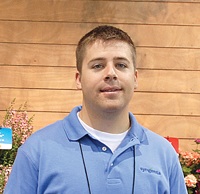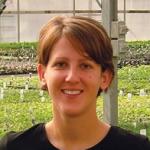
Rooted in Passion — Eric Pitzen 2008
Armed with four diverse internships under his belt and an unwavering zeal for the field, the 2007 winner of the GPN/Nexus Intern Scholarship isn’t just ready to join the industry. He’s poised to help revolutionize it.
When 22-year-old Eric Pitzen was in fourth grade, his perennial-loving grandmother asked him to take one of her purple petunias home and take good care of it. Although Pitzen, who grew up in a farm in north central Iowa and has fond memories of “family time in the vegetable garden,” says that agriculture has always been part of his life, it was that summer and that petunia that really sparked his interest in growing. As the 2007 recipient of the GPN/Nexus Intern Scholarship, it’s Pitzen’s passion for the field, carefully nurtured throughout the years, that has fueled his early success and future aspirations: “The change. The beauty in it, looking at the vibrant colors,” he says. “This is my passion. When I’m out gardening, nothing else matters. Everything is lifted off my shoulders.”
A Roadmap to Success
With only one semester to go before graduating from Iowa State University in Ames, Iowa, with a degree in horticulture and a specialization option in greenhouse production and management, Pitzen already has four internships under his belt, giving him a unique understanding of the many different facets of the industry. After an inspiring visit with his academic adviser the summer before his freshman year, Pitzen recognized the value of gaining as much real-world experience as he possibly could during his college years. Soon after, he compiled an ambitious class schedule for his undergraduate career that would allow him to complete two extended internships during what would have been his senior year. It meant he would have to take an extra year to graduate, but he would learn more than what a classroom could offer. His determination never wavered, Pitzen says. “It’s kind of like a roadmap. You set these goals, and you follow them.”
Finding his niche. The first stop on that map was an internship with Plantpeddler in Cresco, Iowa, after his freshman year of college. He spent the majority of his time at Plantpeddler working as a trial gardens groundskeeper and helping out in the greenhouse. Before the internship, Pitzen says, he didn’t have a clear idea of exactly what vegetative annuals were, but by the summer’s end, he had found his niche. “That’s where I really fell in love with [the vegetative annual market]. I knew this was going to be my venue in the industry.” Pitzen describes a colorful, hot trial day in July as the highlight of his internship. “Seeing everything in bloom,” the expressions on people’s faces as they perused the different trials, and being trusted to answer customers’ questions gave him a sense of accomplishment after a summer of hard work.
Basics of breeding. The following summer, he experienced a different side of the industry through a production research internship with Ball Horticultural in West Chicago, Ill., with what used to be Ball FloraPlant. He learned the basics of how a breeding company conducts its research and development with new and exciting products amid a fast-paced, fast-changing field. He also “networked like crazy,” even attending the OFA An Association of Floriculture Professionals Short Course in Columbus, Ohio. After leaving Ball, “I had a really good understanding of how the industry conducts business and runs smoothly through each season,” he wrote in his winning essay.
Thriving under pressure. Next on his roadmap was an extended internship with C. Raker & Sons in Litchfield, Mich., during the summer and fall of 2006. During this third internship, he got to test his initial interest in a career as a vegetative young plant specialist. Raker’s was going through staffing changes at the time, and Pitzen jumped at the opportunity to take over the interim grower position, in charge of the propagation area, until the company found a permanent, full-time grower. The level of responsibility thrown at him after only three weeks into the internship was phenomenal, Pitzen says. “I learned so much about culture, how things shouldn’t be done on a trial and error basis, and how they should be done. They gave me free rein.”
Seeing the big picture. While networking at Short Course, Pitzen was introduced to the head of the intern program at Tagawa Greenhouses Enterprises in Brighton, Colo. That chat led to his last and most recent internship: a six-month Vic and Margaret Ball Internship at Tagawa Greenhouses during the spring and summer of 2007.
The intern program lets students participate in all aspects of the business, including seeding, production, inventory, quality control and even marketing, says Bill Kluth, vice president of business and technology operations at Tagawa, who served as Pitzen’s mentor throughout the internship. “He got an opportunity to experience everything that we do here.” Pitzen has a promising future ahead, says Kluth, who describes him as “very bright, very eager, very capable and very interested in the greenhouse business.” It’s always exciting to see a young person who wants to join the field, Kluth says.
Pitzen recalls that his first duty at Tagawa’s was the tough, dirty job of bagging, remixing and sampling soil. Although at first he questioned why given his experiences and college education they had him “doing manual labor,” he quickly answered his own question. “You need to learn every job in the greenhouse to be able to make managerial decisions,” he says. His time at Tagawa really drilled home how the different parts of the industry merge together to operate efficiently. “One thing slows everything down. It’s a snowball effect,” he says. “All key components need to be hitting on all cylinders to have the business run smoothly.”
A Cutting-Edge Career
While Pitzen’s extensive internship experience throughout the country helped him grasp the big picture of the industry, it also helped him narrow down what segment he might thrive best in. For Pitzen, that would be the “cutting-edge” area of new-product development and breeder relations in the vegetative plant market. “The constant change really grabs my attention,” he says. “I really liked that it was the cutting-edge stuff, the new stuff, stuff that had not come out in the market yet.”
This area also would give him the opportunity to take advantage of another strong asset his communication skills by serving as a liaison between consumers and industry members.
Pitzen says that he is grateful for the opportunity to have held such diverse internships and credits them for giving him the direction he needed as he prepares to enter the industry. “Different doors opened for me that kept leading me to where I want to go after school,” he says. “Growing could be a possibility, but the better fit for me right now is new-product development and breeder relations.”
Leading the Transition From Art to Science
With his thirst for challenge, passion and strong work ethic, Pitzen doesn’t plan on simply joining the industry once he graduates.
He wants to help revolutionize it. One way he hopes to emerge as a leader is by tackling the vegetative plant market, which he believes is still in its infancy when compared to the more established field of seed-plug production. “I want to be one of the people to help change it from an art to a science,” Pitzen says. “This is where the interface between my classes and my internships will be able to help me be one of the people to help develop the vegetative market.”
Feeding the Future
Emerging young leaders such as Pitzen, who have demonstrated a commitment to propelling the industry forward during these challenging times, deserve to be recognized. The future of the field depends on the youth, says Cheryl Longtin, chairman and CEO of Nexus Corporation. “The only way we really succeed is if we feed our future generation,” she says. The intern scholarship gives young students a “peer role model” that they can relate to and aspire to emulate, Longtin adds.
Pitzen couldn’t agree more. He says that during his first talk with academic adviser Dr. Richard Gladon, whom he describes as the greatest mentor of his college career, he learned that a past Iowa State University graduate had just won the GPN/Nexus award. “I thought it was the neatest thing,” he says. “I set my goal from that day that I was going to win this award. This is a huge satisfaction.”
Students like Pitzen, who aren’t afraid to set high goals for themselves and work hard to see those goals fulfilled, “give me great hope for the future of the industry,” Gladon says. He says every new semester, he welcomes students with the following advice and charge: “You must not react to change. You must initiate it. Don’t just think inside the box,” he says. “Look at things and say, ‘Why not? Why can’t we do it this way?’ Eric listened to that approach.”
The broad experiences that Pitzen has gleaned from his internships have armed him with a unique perspective, says Gladon. In a recommendation letter on Pitzen’s behalf for the GPN/Nexus Intern Scholarship award, Gladon writes, “He truly is a gem in everything that he does. He exemplifies just about everything that is good about our young leaders of today, and I am sure that he will be a leader in the future.”
Drawing Youth to the Industry
For the industry to continue to be viable and attract young, promising students, it needs to reach out and educate the new generations, Pitzen says. “Young people need to be involved. Everybody is trying to figure out how we can tap into the younger generation. How many people my age have extra money to spend on flowers or even want to? We need to somehow market plants, make them more appealing than that iPod,” he says. “A lot of people don’t even know what horticulture is. It’s all around us. The grass we walk on, the trees we sit under. People don’t even know what it is, and they’re walking and standing on it. We need to educate young people.”
Kluth of Tagawa recognizes the need to attract young people to horticulture and open their eyes to the myriad opportunities the field has to offer them, from pulling a hose to running a company. “There’s a lot of things in between,” he says. “We see the industry as being dynamic and in need of new enthusiasm coming from outside traditional methods.”
A New Look
As Pitzen prepares to enter the field after graduation, he is already thinking of what the industry might look like down the road. Change is certain, he says, and the need to adapt to a new playing field is vital. “People still want the beauty; horticulture is going to be around forever,” but it will have a new look, he says. “It’s going to be a different style: more rooftop gardens, window-box gardens. We need to adapt the crops to different situations and market our products” so that they keep up with new consumer demands and environments.
The rising trend of sustainability will impact the face of horticulture in the near future, and Pitzen says he’s “all for” sustainable practices. It appears the question of, “How do we keep our industry green?” is already brewing in the back of his mind, an example of the bold spirit and initiative he has demonstrated throughout his fledgling career.
Staying True to His Passion
The curiosity that his grandmother sparked in him as a fourth grader has flourished into a deeply rooted passion for Pitzen. He recalls sitting around his grandmother’s kitchen table one day during his junior year of high school, talking with his family about what he planned to study in college. His tightly knit family (Pitzen is the youngest of four boys) encouraged him to pursue a career that he would really love and enjoy. And so far, horticulture appears to have been the right choice.
But a love for the job can only take you so far. By carefully planning his future, working hard and making it a priority to experience firsthand the various facets of the industry, Pitzen has managed to reach all the major goals he has set for himself. The support of his family and the mentors he’s met along the way have helped keep him focused and motivated, he says. And come graduation, there’s no stopping him. “I’m really looking forward to the next chapter in my life,” he says.














 Video Library
Video Library 


















